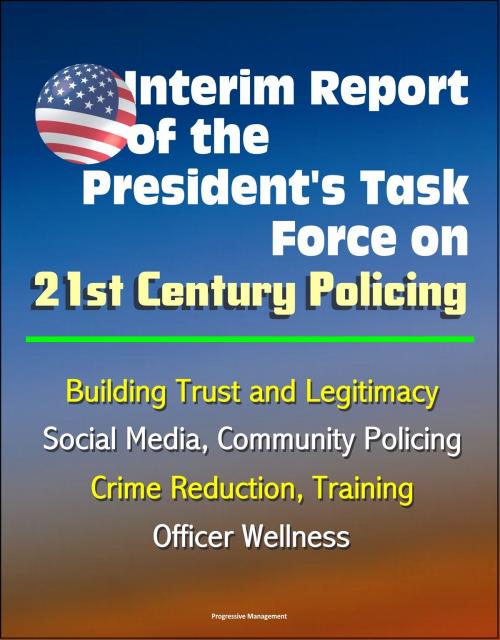Interim Report of the President's Task Force on 21st Century Policing, March 2015: Building Trust and Legitimacy, Social Media, Community Policing, Crime Reduction, Training, Officer Wellness
Nonfiction, Social & Cultural Studies, Political Science, Politics, Law Enforcement| Author: | Progressive Management | ISBN: | 9781310835681 |
| Publisher: | Progressive Management | Publication: | March 3, 2015 |
| Imprint: | Smashwords Edition | Language: | English |
| Author: | Progressive Management |
| ISBN: | 9781310835681 |
| Publisher: | Progressive Management |
| Publication: | March 3, 2015 |
| Imprint: | Smashwords Edition |
| Language: | English |
This report of the Task Force on 21st Century Policing was issued on March 3, 2015.
In light of the recent events that have exposed rifts in the relationships between local police and the communities they protect and serve, on December 18, 2014, President Barack Obama signed an Executive Order establishing the Task Force on 21st Century Policing. In establishing the task force, the President spoke of the distrust that exists between too many police departments and too many communities—the sense that in a country where our basic principle is equality under the law, too many individuals, particularly young people of color, do not feel as if they are being treated fairly. "When any part of the American family does not feel like it is being treated fairly, that's a problem for all of us," said the President. "It's not just a problem for some. It's not just a problem for a particular community or a particular demographic. It means that we are not as strong as a country as we can be. And when applied to the criminal justice system, it means we're not as effective in fighting crime as we could be."
The task force was created to strengthen community policing and trust among law enforcement officers and the communities they serve, especially in light of recent events around the country that have underscored the need for and importance of lasting collaborative relationships between local police and the public. We found engaging with law enforcement officials, technical advisors, youth and community leaders, and nongovernmental organizations through a transparent public process to be both enlightening and rewarding, and we again thank him for this honor. Given the urgency of these issues, the President gave the task force an initial 90 days to identify best practices and offer recommendations on how policing practices can promote effective crime reduction while building public trust. In this short period, the task force conducted seven public listening sessions across the country and received testimony and recommendations from a wide range of community and faith leaders, law enforcement officers, academics, and others to ensure these recommendations would be informed by a diverse range of voices.
Members of the Task Force * Task Force Staff * Acknowledgments * Introduction * Pillar One: Building Trust & Legitimacy * Pillar Two: Policy & Oversight * Pillar Three: Technology & Social Media * Pillar Four: Community Policing & Crime Reduction * Pillar Five: Training & Education * Pillar Six: Officer Wellness & Safety * Implementation * Appendix A. Public Listening Sessions & Witnesses * Appendix B. Individuals & Organizations That Submitted Written Testimony * Appendix C. Executive Order 13684 of December 18, 2014 * Appendix D. Task Force Members' Biographies * Appendix E. Recommendations and Actions
This report of the Task Force on 21st Century Policing was issued on March 3, 2015.
In light of the recent events that have exposed rifts in the relationships between local police and the communities they protect and serve, on December 18, 2014, President Barack Obama signed an Executive Order establishing the Task Force on 21st Century Policing. In establishing the task force, the President spoke of the distrust that exists between too many police departments and too many communities—the sense that in a country where our basic principle is equality under the law, too many individuals, particularly young people of color, do not feel as if they are being treated fairly. "When any part of the American family does not feel like it is being treated fairly, that's a problem for all of us," said the President. "It's not just a problem for some. It's not just a problem for a particular community or a particular demographic. It means that we are not as strong as a country as we can be. And when applied to the criminal justice system, it means we're not as effective in fighting crime as we could be."
The task force was created to strengthen community policing and trust among law enforcement officers and the communities they serve, especially in light of recent events around the country that have underscored the need for and importance of lasting collaborative relationships between local police and the public. We found engaging with law enforcement officials, technical advisors, youth and community leaders, and nongovernmental organizations through a transparent public process to be both enlightening and rewarding, and we again thank him for this honor. Given the urgency of these issues, the President gave the task force an initial 90 days to identify best practices and offer recommendations on how policing practices can promote effective crime reduction while building public trust. In this short period, the task force conducted seven public listening sessions across the country and received testimony and recommendations from a wide range of community and faith leaders, law enforcement officers, academics, and others to ensure these recommendations would be informed by a diverse range of voices.
Members of the Task Force * Task Force Staff * Acknowledgments * Introduction * Pillar One: Building Trust & Legitimacy * Pillar Two: Policy & Oversight * Pillar Three: Technology & Social Media * Pillar Four: Community Policing & Crime Reduction * Pillar Five: Training & Education * Pillar Six: Officer Wellness & Safety * Implementation * Appendix A. Public Listening Sessions & Witnesses * Appendix B. Individuals & Organizations That Submitted Written Testimony * Appendix C. Executive Order 13684 of December 18, 2014 * Appendix D. Task Force Members' Biographies * Appendix E. Recommendations and Actions















